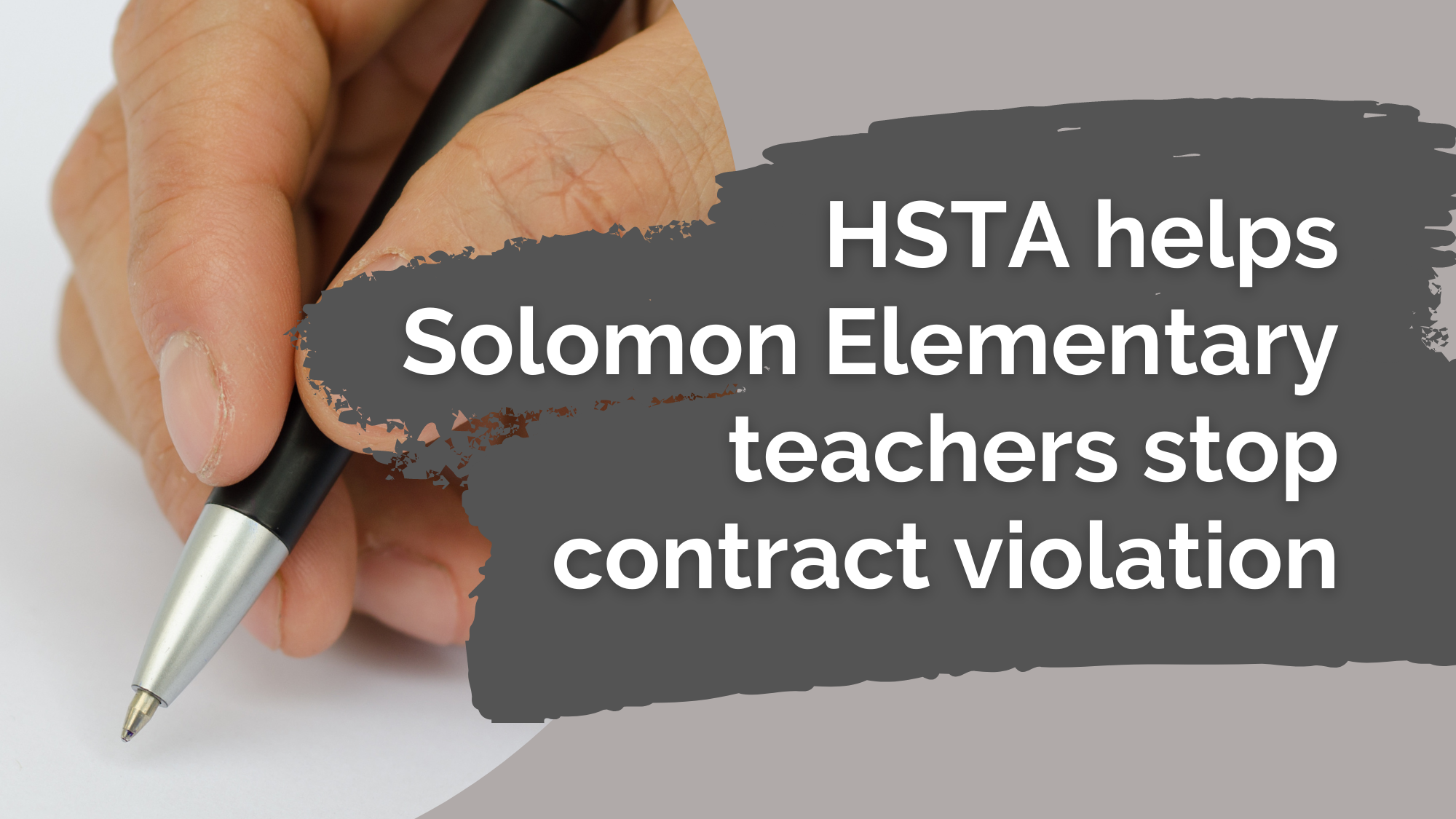Principal cannot direct teachers to substitute during shortages
Posted: February 25, 2022
When David Martin, a special education preschool teacher at Solomon Elementary on Schofield Barracks Army Base in Wahiawa, Oahu, heard his principal was violating the Hawaii State Teachers Association collective bargaining agreement, or contract, at the beginning of the school year, he knew he had to step in.
In August 2021, nine teachers were absent from their classrooms, but the school could only secure four substitute teachers. So the principal, Thomas Swan, texted academic coaches and other non-classroom teachers to fill the remaining openings.
This directive violated Article VI, Section N of the contract, which says: “Teachers shall not be required to substitute nor be responsible for classes or students from classes of other absent teachers.”
When colleagues informed Martin what happened, he began gathering as much information as he could. Then he reached out to HSTA UniServ Director (UD) Amanda Lacar for help.
“I had no idea what to do. I knew that it was a contract violation. But after that, I said well, I don’t know what the steps are,’” Martin said. “It was really good to have (Amanda) there, and she really helped walk me through and told me this is what we need to do, this is how it’s going to work, and just kind of held my hand through the process.”
Together, Martin and Lacar filed a class grievance with the school. A grievance is an alleged violation, misinterpretation or misapplication of the contract. Class grievances represent all teachers who have been wronged by action or inaction on the part of the employer, which in this case applied to non-classroom teachers who were directed to substitute.
Many of the affected teachers were uncomfortable leading the grievance for fear of retaliation, so Martin agreed to speak on their behalf.
“I’m not afraid to stand up and say, ‘Okay, I know that’s not how this is supposed to happen,’” said Martin, who currently serves on the school’s Association Policy Committee (APC), an elected group of HSTA members who are responsible for addressing questions and concerns of HSTA members at the school level. He also previously served as the school’s grievance representative.
“I thought, if I let this happen, it’s going to continue. It’s going to happen again, and I wouldn’t be surprised if (the principal) does more things that violate the contract and he’s not going to care,” Martin explained.
Lacar sent the grievance to the principal, complex area superintendent, and personnel regional officer. Then Martin, Lacar, fellow HSTA Central Chapter UD Ray Camacho, and Swan met for an informal discussion.
“Basically, the principal did admit that he had to direct teachers to substitute. His reasoning was for the safety of the kids; they needed somebody,” Lacar recalled.
Lacar noted that when elective teachers get directed away from their duties, students miss out on art, music, library time, etc., and those teachers still have to make up their own work, so both students and teachers suffer consequences.
The grievance was resolved when Swan agreed to create and adhere to a substitute plan that calls for the school to maintain a pool of qualified substitutes, then seek volunteers, then have administrators or non-BU05 staff cover rooms, and lastly assign casual hires. The plan was then reviewed and approved by the school’s APC.
“That was the main thing,” Lacar said. “While the contract doesn’t specifically prohibit asking, you cannot direct. And then somewhere in there (if a substitute cannot be secured), admin goes in to sub. But we got him to no longer direct teachers to be a substitute teacher.”
Martin credits Lacar for guiding the school toward a successful resolution, which was reached less than six weeks after the violation occurred.
“I think it would have been a lot worse if we didn’t have HSTA there to help us,” he said. “There would be a lot of situations where we would have just been told, ‘Sorry, that’s just how it is, and that’s how it’s going to be,’ so I’m really thankful.”
Martin said of Lacar, “There’s a sense of comfort there, knowing if I do need somebody, whether it’s for me or any of the teachers, I know that Amanda’s there and she’s always willing to help.”
As another positive outcome, teachers at Solomon learned about contractual rights that protect their time to complete their work.
“It’s important to stick to the contract, because teachers over the years have fought for what’s in that contract, and it’s important that HSTA and school-level leaders stand firm on that,” said Lacar, who was a special education teacher and HSTA Central Chapter leader prior to her role as a UniServ director.
Martin advises any HSTA member who experiences issues at their school to reach out to their UniServ director right away. “It doesn’t hurt to ask, especially if you think, ‘Hmmm, that doesn’t seem right,’ and you’re not sure, just reach out and ask.”
Has your UniServ director or any of your HSTA school-level leaders, e.g., head faculty or grievance representative, or Association Policy Committee, helped you solve an issue at your school? If you’re willing to share your story, please let us know by submitting an online contact form here.

